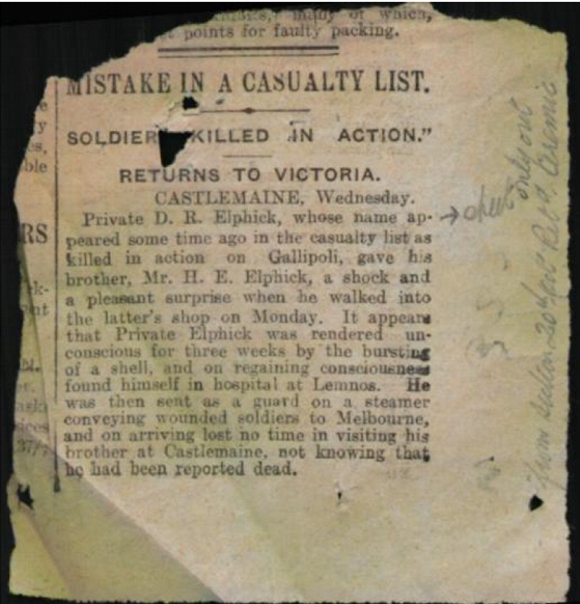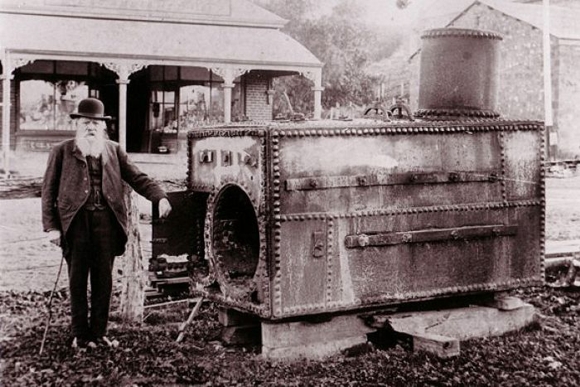“Dead” Soldier Returns
Anzac Day. The day to remember those who fought for our country. Some survived. Many didn’t. And in reality those that returned were changed forever.
It was while I was going through the military records of Arthur Vincent Elphick (Mr Lonetester’s great grandpa), that I kept seeing the name of Donovan Russell Elphick written in his records. Arthur was one of twelve children in the family, and Donovan was his youngest brother.
On checking Donovan’s military records on the National Archives of Australia website, and reading through the dossier, one page in the record jumped out at me. But firstly, some background information …
Born in Prospect, South Australia, but living in Western Australia, 24 year old Donovan signed up to serve his country in January 1915. After training in Western Australia, he was assigned to the 5th Reinforcements 11th AIF, and sailed to Egypt in June 1915, and was obviously in the thick of it from arrival, as within a week of arriving he was in hospital suffering from “deafness”.
From here, I’ll let you read the article as that explains it all …
The above article came from a Victorian newspaper, and is dated 20 October 1915. This story was repeated in numerous Victorian, South Australian and Western Australian newspapers over the weeks following. As you can imagine it was quite a story. And to say that it shocked his brother (Harold), when he walked in would be an understatement.
Donovan was one of six boys in the family, with three going off to war. Sadly only two returned.
And while Donovan Elphick did survive World War 1, he died in Perth on 25 December 1936, aged just 45.
Sudden Death at the Railway Station
Some days just don’t go as planned, and 22 June 1869 was certainly one of those day for the Elphick family of Adelaide.
There’s certain words when researching that grab a researchers attention. One being the phrase ‘sudden death’ with another being ‘inquest’. Both of these we terms I came across in the newspapers on Trove, when looking for info on Mr Lonetester’s 3x great grandpa, William Kennard Elphick.
I imagine that Tuesday the 22nd of June 1869 started out as a fairly standard day for the Elphick family of Adelaide. William Kennard Elphick was out and about, and made his way to the Adelaide Railway Station on North Terrace by late afternoon, either to head out or head home. However that’s when tragedy struck.
While walking down the stairs William collapsed, and died …
INQUEST ON MR W.K. ELPHICK
On Wednesday, Mr. T. Ward, J.P., held an inquest at the Adelaide Hospital, for the purpose of ascertaining the cause of the death of William Kennard Elphick. A Jury of 13 having been empanelled, and Mr. J. M. Dowie chosen foreman, the following evidence was taken, after the body had been viewed:— James March Stacy, bootmaker, said yesterday afternoon about 4.20 he was at the Railway Station. Saw a crowd assembled carrying the deceased, whose body he had just seen in the dead-house. Recognised it as that of W. K. Elphick, late of the Burra Mine. Some females bathed his head with cold water. Felt his pulse, and found only one pulsation. Then placed his hand on the heart, which had ceased to beat. Dr. Phillips then came in. Left the deceased in charge of the police, and afterwards communicated with his friends. By a Juror—The cold water was applied whilst he was feeling the pulse of the deceased.James Phillips, surgeon, said he had made a postmortem, examination of the deceased, and on examining the heart found certain portions of it in a greatly dilated state. One part in particular was excessively attenuated. There was fatty degeneration of the structure of the heart, and the arteries which supply the tissues of the heart with blood were ossified. Found also the surface of the brain in a congested state. There was a sudden cessation of the action of the heart from want of power to carry on the circulation. This was undoubtedly the cause of death.
Herbert D. Gouge deposed to being at the Railway Station on Tuesday, and seeing the deceased coming down the terrace towards the station. He came outside, and as witness was about to speak to him, deceased made a plunge forward. The messenger of the Hospital came up and helped witness to carry him into the waiting-room. He did not speak, but groaned heavily once or twice. Dr. Phillips arrived about 10 minutes afterwards. By a Juror—Deceased did not appear to have been walking fast. The Coroner then summed up, and a verdict to the effect that the deceased died from disease of the heart was returned. [The South Australian Advertiser, p. 3. 24 June 1869. http://nla.gov.au/nla.news-article31990554]
It is obvious that William Elphick was someone of note, as every South Australian newspaper that is currently on Trove, has details of his death, and inquest. Mind you having lived and worked not only in Adelaide, but also at Burra, and in Western Australia as well, it’s not really that surprising.
But finding this info was a surprise, and a sad end to one of Mr Lonetester’s emigrating ancestors. William together with his wife arrived on the “Plantar” ship in 1839, after a unbelievable 6 month journey. It took longer than the regular 4 months, as the captain was incompetent as got lost on the way, missing a port, and then had to detour elsewhere to get supplies. Not only that, but the crew mutinied, so a new crew had to be found … and so on. It’s truly stranger than fiction tale, but it happened. Details of the voyage can be found in a shipboard diary that a fellow emigrant wrote.
![Adelaide Railway Station, North Terrace, 1870 [From the State Library of South Australia, Number: B.....]](http://www.lonetester.com/wp-content/uploads/2017/04/Adelaide-Railway-Station-1870-SLSA-580.jpg)
Adelaide Railway Station, North Terrace, South Australia, 1870
[Courtesy of State Library of South Australia, B 69476]
1 Name. 61 Variants
Anyone who’s been researching been researching for longer than a week will know that name variants play a big HUGE part in research. Both with first names, and surnames. Figuring out how names were potentially spelt (or ‘spelled’ for my North American readers) can be the difference between finding them or not.
I’m not going to go into the in’s and out’s of name variants, but rather I wanted to highlight two particular surnames, and all the variants that I’ve found for them so far. There’s 61 of them for one, and 31 for the other. And truth is, I really wouldn’t be surprised if more show up.
So let’s start with ELLIOT. This is one of Mr Lonetester’s branches, while ELLIOTT (with two “Ts”) is one of mine, with no connection that I know of between them at this stage. We all know that there are numerous variants of Elliott: one “L”, two “Ls”, one “T”, two “Ts”, but what I didn’t realise is just how many more there really are.
One thing I like to do when beginning searching a new surname is to note down all the variants. That way when I’m searching, be it a website, a book or records, I can look for them all, and see what I come up with.
Mr Lonetester’s ELLIOT family possibly came from Sussex (that’s still to be verified), but I headed (online) to the Sussex Family History Society to browse around and see what they had. Now they have the coolest thing on their website, and that’s the Sussex People Index. In their words …
The Sussex People Index consists of any names that anyone can submit from anywhere – the only condition is that the event reported must happen in Sussex and there must be an identifiable source (not a website please). Wills’ beneficiaries witnesses and lawyers, information from Birth Marriage or Death certificates, tax records, settlement orders, masters and apprentices, landowners, licences issued to publicans, magistrates, churchwardens, names taken from a book which has been indexed, etc. Please not baptisms, burials, memorial inscriptions, census, or pre-1837 marriages which all have their own indexes. There are 120,000 entries referring to 230,000 people with 11,730 surnames (excluding variants).
So anyone can look at the list of surnames, whether you’re member or not, with members being able to log-in and check the details (entries for each name). Now I am a member, but have forgotten my log-ins, so will follow up on that one later, but I was able to use the surname list to create a list of alternate spellings which was handy.
My list of variant spellings for ELLIOT/ELLIOTT are:
Eleot, Eleott, Elicot, Eliot, Eliote, Eliots, Eliott, Eliotte, Ellioit, Ellioitt, Elliot, Elliote, Elliott, Ellliott, Elloit, Elloitt, Ellot, Ellott, Ellyat, Ellyate, Ellyatt, Ellyet, Ellyett, Ellyot, Ellyott, Ellytt, Elot, Elyat, Elyatt, Elyeat, Elyet, Elyete, Elyett, Elyot, Elyote, Elyott, Elyotte, Elyout, Leliat, Leliet, Leliot, Leliott, Lelliat, Lelliatt, Lellicot, Lelliet, Lelliot, Lelliott,Lelloitt, Lellut, Lellyett, Lellyot, Lellyott, Lelyet, Lelyot, Lelyoth, Lelyott, Lylliot, Lylliott, Lyllyatt, Lyllyott.
And while I was there, Mr Lonetester’s ELLIOT married an ELPHICK (from Sussex), so I created a variant list for Elphick as well. Again, I was blown away by the number of variants that there are. 31 just for Elphick, who knew!
My list of variant spellings for ELPHICK are:
Elfeck, Elfecke, Elffeck, Elffecke, Elfhick, Elfic, Elfick, Elficke, Elfig, Elfigg, Elfrick, Eliphicke, Ellfeck, Ellfick, Ellpeck, Ellpeheg, Ellphick, Elpheck, Elphecke, Elpheke, Elphic, Elphich, Elphicke, Elphik, Elphycke, Elpick, Elpiiick, Elpphick, Elprick, Elspick, Lphick.
So to anyone that says “my family never had any variant spellings”, I say “rubbish”. There’s always name variants. Sometimes it’s on purpose, sometimes it’s a transcription error either by the person who created the record way back then, or by someone transcribing it more recently. Names were so often written as they sounded, rather than a strict spelling, and combine that with various accents, and you can see why there’s so many variants.
Whether you use the Sussex People Index list or any name other list, to create your own name variant list, is entirely up to you.
But this is just a reminder to keep name variants in mind when searching.
Genealogy Close Calls
I was inspired to write this post as a result of reading Heather Rojo’s blog, Nutfield Genealogy, when wrote about her “Top Ten Genealogy Close Calls“.
The title alone intrigued me, as I wasn’t quite sure what she meant by ‘genealogy close call’. But she explains it well:
“What’s a “Genealogy Close Call”? It happens when I research an ancestor and realize that if fate didn’t intervene I wouldn’t be here today. Some of our ancestors narrowly escaped disasters, only to live on and produce a descendant that led to YOU. “
So that got me thinking. Did I have any “genealogy close calls”. My initial thoughts were no, but as the day progressed I remembered the following incidents:
MY GENEALOGY CLOSE CALLS
WILLIAM KENNARD ELPHICK (c1815-1869) – Survived the voyage
and wife SUSANNA ELPHICK (nee ELLIOT) (c1812-1899)
William and his wife Susanna married in London in November 1838, and then immediately boarded the ‘Plantar’ ship to start a new life in Australia. The journey which on average takes about four months, took almost six months partly due to the captain’s incompetence – missing a port where they were meant to collect supplies, and having to stop elsewhere as a result, together with other misadventures such which included much of the crew being lost, as were some passengers and most of the livestock. Eventually a new crew was acquired and the journey continued. For more on their story click here. The Elphick family settled in Adelaide, and had numerous children. The Elphick’s are Mr Lonetester’s 3x great grandparents. While not everyone survived this journey, they did, and if they hadn’t he wouldn’t have be here.
OTTO RAFAEL WINTER (1880-1961) – WW1 injuries
Otto Winter was born in Finland and spent 7 years sailing the world on a merchant sailing ship. I’m sure if I had detailed of every voyage there would be ‘close call’ stories there, but I don’t, so I won’t make assumptions. After having jumped ship in Australia, he chose to get naturalised and in 1916 he signed up for the Australian Army in WW1 and was sent off to Belgium. During his three years in the AIF he was wounded several times, including being shot in the stomach and poisoned with mustard gas while tunnelling at Ypres. Despite this, he survived and made it home to his young wife and baby boy. Had he not survived my grandma would not have been born. For more on Otto Winter click here.
————————
GENEALOGY CLOSE CALLS, BUT NOT CLOSE ENOUGH
ISAAC RICHARDSON (1804-1873) – sentenced to death
A labourer in Kent, Isaac Richardson together with his bother Simeon, were rioting to stand up for their rights during the Industrial Revolution. Sentenced to death, the local townspeople petitioned to save their life and both were then sentenced to transported to Van Diemen’s Land for life instead. Isaac’s wife Matilda (nee Bonner) and the two children Edward and Esther were given assisted passage in 1837-38. Isaac was granted a conditional pardon in 1842. Isaac and Matilda had a total of 9 children, and continued to live in Tasmania. Isaac’s first born child, Edward was my 3x great grandpa). As Edward was already born before Isaac was transported, this doesn’t count as a ‘close call’ for me, but for descendants of the 7 children that were born later it certainly would. You can read more about Issac Richardson here.
WILLIAM RICHARD RANDELL (1824-1911) – near explosion
William Richard Randell is known as the father of paddlesteamers on the River Murray. He emigrated with his parents from Devon, England in 1837 and initially they bred cattle and drove them along the land along the Murray River, in South Australia and later setup flour mills in the Adelaide Hills. Despite having no previous experience in navigation or having ever seen a steamboat, W.R. Randell became obsessed with building a paddlesteamer to transport supplies up and down the river. And by 1853 the “Mary Ann” which he built became the first paddlesteamer in South Australia. The boiler, a box shape, and made of lead riveted together was said to have “needed chains wrapped around the middle. Even then when proceeding at maximum speed the sides and top were observed to swell in and out like a concertina”. And while it didn’t explode, but it seems like it wasn’t far from it. William Richard Randell is a half-brother to my 2x great grandpa … so he’s not a direct relative. But had he not survived his paddlesteaming days, it certainly would affected his direct line.
GEORGE PHILLIPS (1865-1941) – nearly drowned
There’s a story that’s been handed down the generations in my family about George Phillips. George Phillips and his wife Mary Ann (nee Kemp), along with their baby boy, also George, emigrated from England to South Australia in 1865 onboard the “Adamant”. The story goes that a fellow female passenger was holding baby George, when Mary Ann had a bad feeling or premonition, so she collected him from the lady, and shortly afterwards that poor lady fell overboard. I don’t know the validity of the story, except that there was a lady who drowned on the voyage out mentioned in the surgeon’s journals. So it is a possibility. And as baby George survived, he counts as a genealogy close call, although not for me, as he’s a brother to my great great grandpa, not my direct line.
————————
While I don’t have many ‘close calls’ in this list. Ok technically only two, this just means that I have more research to do. More digging to find the stories.
Just think of all the possibilities there are, past and present: car accidents, horse and cart accidents, farm accidents, mining accidents, fires in the house, other occupational accidents, childbirth, fell down steps, numerous diseases and ailments, natural disasters (fires, floods, famine, tornado, cyclone, hurricane), major sporting injuries, a close encounter with a wild animal, or was your ancestor known for getting in fights? The list is endless …
Now I’m off to see what else I can find …






